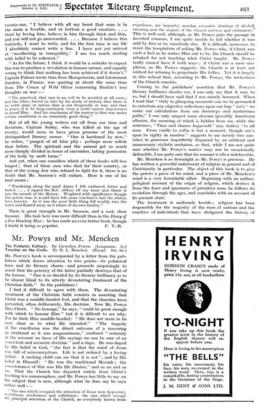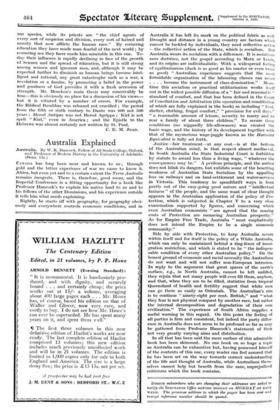Mr. Powys and Mr. Mencken
Mn. Powys's book is accompanied by a letter from the pub- lishers which draws attention to two points—its polemical force and its literary charm—and proceeds surprisingly to assert that the potency of the latter partially destroys that of the former. "One is so dazzled by its literary brilliancy as to be almost blind to its utterly devastating treatment of the Christian faith." So the publishers !
I find it difficult to agree with them. The devastating treatment of the Christian faith consists in asserting that Christ was a muddle-headed fool, and that the churches have perverted, often deliberately, His doctrine. Now Mr. Powys likes Christ. "No homage," he says, "could be great enough with which to honour Him" but it is difficult to see why. For he finds Him muddle-headed : "He does not seem to be very clear as to what He intended." "The tragedy of the crucifixion was the direct outcome of a reasoning as irrational as it was magnanimous," confused "certainly in the account we have of His sayings we can be sure of no consistent and accurate doctrine" and a dupe. He was duped by His belief in Cod, "the fact is that the mind of Jesus was full of misconceptions. Life is not ordered by a loving father. A sucking child can see that it is not " ; and by His belief in Himself : "He was the traditional Messiah ; the consciousness of this was His life illusion," and so on and so on. That the Church has departed widely from Christ's teaching is a commonplace, and Mr. Powys has little to say on the subject that is new, although what he does say he says rather well :—
"The sins which occupied the attention of Jesus were hypocrisy, worldliness, intolerance and selfishness: the sins which occupy the principal attention of the Church, as everybody knows from experience, are impurity, murder, excessive drinking of alcohol, swearing and the neglect of the Church services and ordinances." This is well said, although, as Mr. Powys puts the passage in inverted commas, I am quite unable to tell whether it was said by him or by somebody else. It is difficult, moreover, to resist the temptation of asking Mr. Powys why, if Christ was such a fool as he makes Hint out to be, the Church should be rebuked for not teaching what Christ taught. Mr. Povvys really cannot have it both ways ; if Christ was a mere sim- pleton, as Mr. Powys suggests, the Church is at least not wicked for refusing to perpetuate His follies. Yet it is largely in this refusal that, according to Mr. Powys, the wickedness of the Church consists.
Coming to the publishers' assertion that Mr. Powys's literary brilliance dazzles me, I can only say that it may be so, but I should have said that I was merely bemused. When I read that "Only in glimpsing moments can we be persuaded to entertain any objective reflections upon our hap " (sic) " we make our calculations from our doorsteps and nasturtium paths," I can only suspect some obscure (possibly American) allusion, the meaning of which is hidden front me, while the sentences, "Time and chance happenelh" (my italics) "to all men. From cradle to coffin is but a moment, though one's span be eighty in number" suggests to me merely two mis- takes in grammar imperfectly disguised by an artificial and unnecessary stylistic archaism, so that, while I am not quite sure whether Mr. Powys's matter may not be occasionally defensible, I am quite sure that his manner is often indefensible.
Mr. Mencken is as downright as Mr. Powys is precious. He has written a powerful indictment of religion in general and of Christianity in particular. The object of this book is to give the priests a piece of his mind, and a piece of Mr. Mencken's mind is a very formidable affair. Beginning with an anthro- pological account of the origin of religion, which derives it from the fears and ignorance of primitive man, he follows its evolution through the ages, and concludes with an account of its present state.
The treatment is uniformly hostile ; religion has been responsible for the majority of the wars of nations and the cruelties of individuals that have disfigured the history of
our species, while its priests are "the chief agents of every sort of suspicion and division, every sort of hatred and enmity that now afflicts the human race." By cornering education they have made man fearful of the next world ; by cornering sex they have made him miserablein this one. To- day their influence is rapidly declining in face of the growth of Science and the spread of education, but it is still strong among women and ignorant men, and, although it may be expected further to diminish as human beings become intel- ligent and rational, any great catastrophe such as a war, a revolution or a famine, by promoting a belief in the power and goodness of God provides it with a fresh accession of strength. Mr. Mencken's main thesis may conceivably be true—this is obviously no place for a discussion of his views— but it is vitiated by a number of errors. For example, the Biblical Barabbas was released not crucified ; the period from the fifth or sixth century to Dante was 800 not 500 years ; Herod Antipas was not Herod Agrippa ; Kid is not spelt " Kial," even in America ; and the Epistle to the Hebrews was almost certainly not written by St. Paul.
C. E. M. JOAD.





















































 Previous page
Previous page